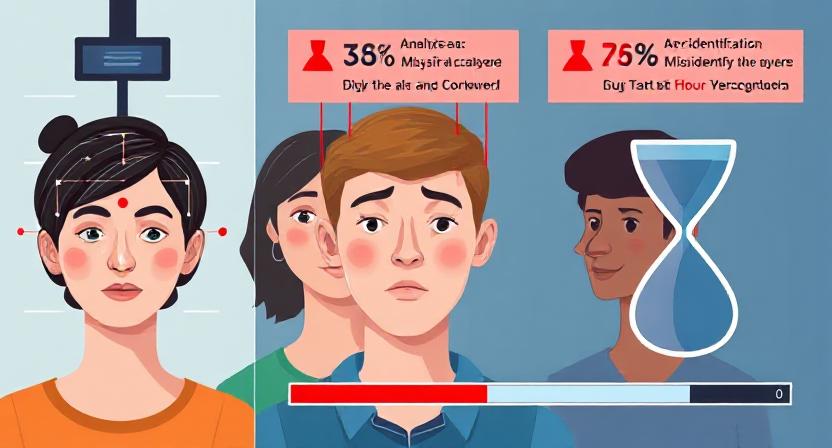UK Age Checks Punish Compliance Reward Cheats?

UK Age Check Law A Double-Edged Sword? The implementation of age verification laws in the UK has created an unintended consequence. Specifically websites that diligently...
⏱️ Estimated reading time: 4 min
Latest News
UK Age Check Law A Double-Edged Sword?
The implementation of age verification laws in the UK has created an unintended consequence. Specifically websites that diligently comply with the regulations appear to be suffering while those that ignore them may be gaining an advantage. Consequently this raises serious questions about the effectiveness and fairness of the current enforcement.
The Compliance Conundrum
Companies investing in age verification systems often face increased costs and a potentially reduced user base. Moreover implementing solutions like those offered by AgeChecked and Veriff requires both financial investment and user friction. Consequently this friction can deter potential customers leading to a decrease in traffic and revenue for compliant websites.
The Non-Compliance Benefit
- Lower costs & easier implementation
Implementing age checks especially robust ones involving ID or biometric systems can be expensive. By skipping these websites avoid monetary and technical burdens.
Platforms that enforce such verification often see significant drops in traffic while non-compliant rivals gain user migration sometimes seeing traffic double or triple. - Better user experience less friction
Removing age checks eliminates additional clicks form-filling or attention-grabbing pop-ups. Users reach content faster and more seamlessly which boosts retention and reduces bounce rates. - Competitive edge through higher traffic
A smoother experience draws in users who might otherwise abandon sites that pose barriers especially in content-sensitive industries like adult entertainment.
Risks & Drawbacks to Consider
- Regulatory and legal exposure
Skipping age verification may expose websites to non-compliance with laws in places like the U.K. U.S. or Australia. This could lead to heavy fines or other penalties. - Privacy and ethical issues
Age verification often involves collecting sensitive user data. If verification is skipped sites may evade these risks but that doesn’t shield them from criticism or future liabilities regarding access by minors. Meanwhile systems that do collect data have their own privacy pitfalls.Scientific American - Public perception and brand reputation
Websites that lack age gates risk being seen as irresponsible especially if minors access mature content. This can damage credibility and user trust. - Shifting to unsafe or unregulated platforms
Tightened regulations may push users toward unregulated or unsafe alternatives that avoid any form of compliance.
UK Traffic Shifts & Privacy Loopholes
In the UK the Online Safety Act has mandated strict age checks like facial scans or ID uploads. As a result compliant sites experienced steep drops in traffic. Meanwhile non-compliant adult sites saw visitor numbers double or triple exploiting the regulatory gaps to their advantage.

Australia Unreliable Tech Misidentification and Delays
Implemented age-assurance tools in Australia such as facial recognition showed high error rates particularly near the threshold age of 16 and among non-Caucasian users. Misidentification rates for 15-year-olds reached 73% raising serious concerns about the fairness of enforcement.Additionally some users faced wait times of up to an hour just to be age-verified hampering friction-free access.
United States Blocking Over Compliance
In states like Florida and Utah adult platforms such as Pornhub opted to block all access rather than navigate burdensome age-verification laws. Consequently this move sidestepped compliance and sidelined enforcement altogether. Even so with the U.S. Supreme Court upholding such laws as constitutional critics note that users can still bypass them easily via VPNs and non-compliant sites.
Germany Court Battles and Delayed Blockades
Germany’s strict regulations require ISPs to block adult platforms without age verification. However actual enforcement stalled due to legal disputes. Although courts granted regulators like the media authority NRW the power to block sites the process has been bogged down in appeals. Consequently sites remain largely accessible.
Global Concerns Fragmented Regulations
States in the U.S. vary widely in their approach to age verification from third-party KYC methods Arkansas to vague undefined requirements Utah. This patchwork leads to enforcement uncertainty with platforms left guessing how to comply or exploiting gaps.Brookings Similarly authorities like ICMEC argue that site-level mandates are inherently inconsistent and easier to evade. They advocate for more uniform device-level verification instead.
Possible Solutions
To address this imbalance authorities could consider several measures:
- Stricter Enforcement: Actively identify and penalize non-compliant websites.
- Incentives for Compliance: Offer tax breaks or subsidies to companies that implement age verification.
- Simplified Solutions: Develop user-friendly and cost-effective age verification tools.
Related Posts

AI in 2026 How Intelligent Agents Are Becoming Trusted Work Partners
In 2026, artificial intelligence has transcended its role as a mere productivity booster, emerging as...
February 4, 2026
Bluesky Enhances Moderation for Transparency, Better Tracking
Bluesky Updates Moderation Policies for Enhanced Transparency Bluesky, the decentralized social network aiming to compete...
December 11, 2025

Google Maps: Gemini Tips, EV Charger Predictions & More!
Google Maps Gets Smarter: Gemini Tips & EV Updates Google Maps is enhancing user experience...
December 9, 2025










Leave a Reply